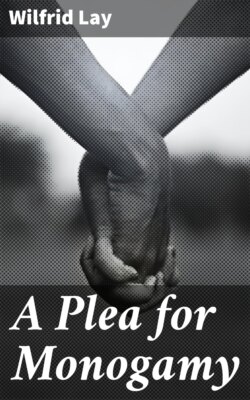Читать книгу A Plea for Monogamy - Wilfrid Lay - Страница 7
На сайте Литреса книга снята с продажи.
§ 4
ОглавлениеTable of Contents
In this book an attempt is made to show how men can so control their marital situation as to make more and more unnecessary the tightness of the bond that operates to make many marriages so like an imprisonment for both husbands and wives. Also the suggestion is made that a certain type of action on the husband’s part will work in the direction of making both prostitution and divorce less and less necessary.
This type of behaviour, comparatively rare at the present time, is based on a pattern that will at once appeal to the sense of justice innate in every man. Although it implies a relaxation of much present constraint and artificiality in the married relation, it is in no sense antagonistic to true monogamous union but rather constitutes a much more advanced and progressive attitude toward the most vital question of the day.
The marriage of the near future, it is hoped, will be inspired by our latest scientific knowledge concerning the psychology of sex, including the ever present unconscious factor, which is the most potent factor in the marital situation and which has been necessarily ignored for the simple reason that, previous to a few years ago, everyone was ignorant of the unconscious mechanisms and their relation to each other, in making for mistakes and unhappiness in marital behaviour.
If every man would exercise the control over himself (the opposite of asceticism in the ordinarily accepted sense), the control which alone will secure that emotional ascendancy over his wife, necessary for happy marriage and unconsciously longed for by the wife, more than any other thing in marital life, he will reduce to the lowest possible frequency both divorce, which is the issue of so many marriages, and prostitution, which has for so many centuries been regarded as the bulwark of marriage and the protection of the wife.
As Grete Meisel-Hess says in her Sexual Crisis, “The happy marriage of the securely placed wife is founded upon the degradation and debasement of another woman, the prostitute”; and Havelock Ellis in the sixth volume of his Psychology of Sex (page 296) says that “the value of marriage as a moral agent is evidenced by the fact that all the better-class prostitutes in London are almost entirely supported by married men,” while “in Germany, as stated in the interesting series of reminiscences by a former prostitute, the majority of the men who visit prostitutes are married.” He then gives several reasons why this is the case.
If every wife should give serious thought to exactly how much degradation the prostitute has been considered to save her from, she would realize that what the prostitute guards her from could be transmuted by the proper attitude on the husband’s part from a crassly physical into a highly spiritual thing. And she would move heaven and earth to induce her husband to study the fine art of love in so thorough a manner that there could be no doubt of the happy issue of their mutual love life.
Critics of marriage as it exists today have amply demonstrated that it shields more immorality, in some cases, than even prostitution itself; and it is a fact that this immorality comes from a lack of spiritual rapport between husband and wife, that can be effected primarily, if not solely, by the husband.
